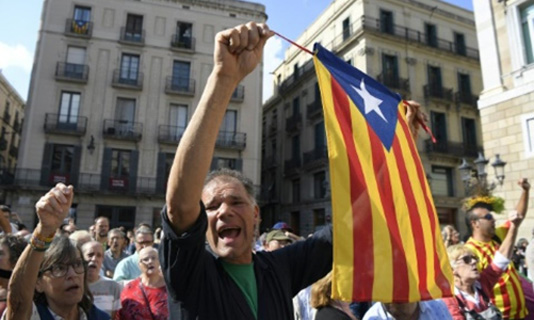BARCELONA, Dec 21, 2018 (BSS/AFP) – Catalan pro-independence groups plan
to protest and block roads in Barcelona on Friday as Spanish Prime Minister
Pedro Sanchez holds a cabinet meeting in the city under tight security.
The weekly cabinet meeting usually takes place in Madrid but Sanchez’s six-
month-old Socialist government decided to hold it in the Catalan capital as
part of its efforts to reduce tensions in Catalonia, which last year made a
failed attempt to break away from Spain.
Sanchez and the head of Catalonia’s separatist government, Quim Torra, have
expressed commitment to an “effective dialogue” to try to resolve the dispute
over the wealthy region’s status within Spain, after the two men held talks
in Barcelona on Thursday night.
The government will use the cabinet meeting which will get underway at 10
am (0900 GMT) to approve a 22 percent increase in the minimum wage, a pay
hike for public workers and announce investments in infrastructure projects
in Catalonia, which is home to some 7.5 million people and has its own
language.
But the timing of the meeting — a year to the day after Madrid held snap
elections in the region after blocking its move for independence — has been
called “a provocation” by separatist leaders.
– ‘Ungovernable’ –
A radical separatist group, the Committees for the Defence of the Republic
(CDRs), has vowed to try to stop the cabinet meeting from going ahead by
circling the building where it will be held.
The group has blocked highways and railways in the past, and tried to enter
the Catalan regional parliament by force.
“We will be ungovernable on December 21,” the group has repeatedly tweeted.
Grassroots separatist organisation ANC, which has previously staged massive
pro-independence street demonstrations in Barcelona, has urged supporters to
block the streets of Barcelona on Friday with their vehicles.
About 20 pro-independence groups, including the ANC, called on their
supporters to march through the streets of Barcelona at 6 pm (1700 GMT).
Amid fears of violence on the part of radical separatists, the Spanish
government has sent police reinforcements to Barcelona and Catalan leaders
have repeated their call for peaceful protests.
– Divergent positions –
Catalonia declared independence in October 2017 but to no avail after
pushing ahead with a banned independence referendum.
Sanchez took office as prime minister eight months later after winning a
surprise vote of no-confidence against the previous conservative government
with the support of Catalan separatist parties.
He initially adopted a more conciliatory tone towards Catalonia than his
conservative predecessor but the effort to ease tensions with Catalonia
eventually hit a wall.
Catalan separatists also announced that they would not vote in favour of
the leader’s 2019 budget after public prosecutors in November called for
stiff prison sentences for 18 pro-independence leaders facing trial over the
region’s failed secession bid.
Sanchez adopted a harder line after far-right and anti-separatist party Vox
won seats for the first time earlier this month in a regional election in
Andalusia, a Socialist stronghold.
During a recent debate in parliament, Sanchez compared Catalonia’s break-
away movement to Britain’s campaign to leave the European Union. Both were
built on “a tale of invented grievances, magnified by manipulation”, he said.
His tone changed after his meeting with Torra, although the solutions to
the Catalan conflict proposed by the two leaders remain distinct.
Sanchez has proposed giving Catalonia more powers while Torra wants a
legally binding referendum on independence.
“We know that the initial positions are very divergent but we have to see
how we advance,” Catalan government spokeswoman Elsa Artadi said.



